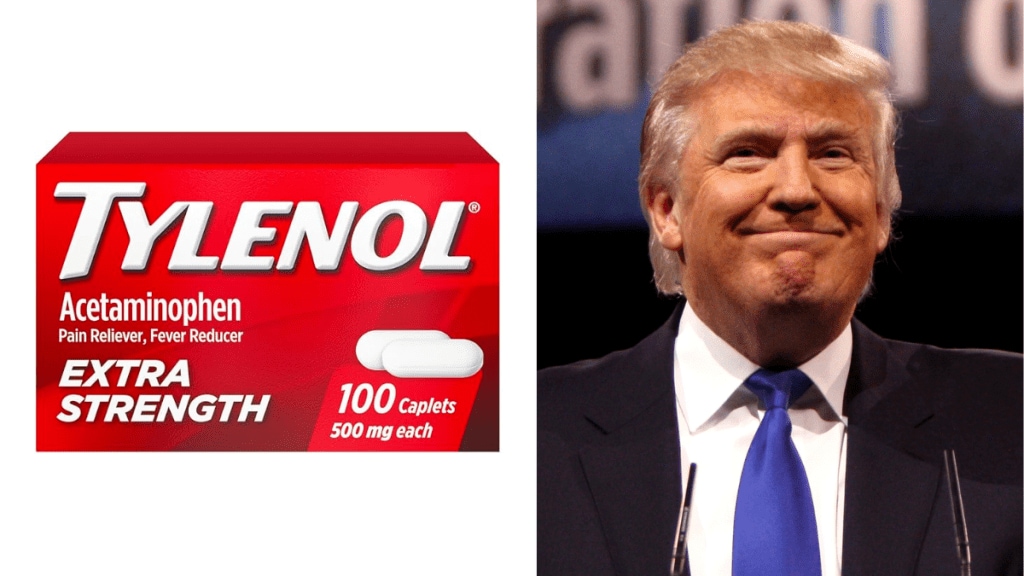Days after US President Donald Trump sounded off the alarm against pregnant women using paracetamol or acetaminophen (in the US – Tylenol and similar products), a report alleged that its maker was long in the know about its link to neurological conditions like autism in children.
On Friday (US time), the Daily Caller News Foundation Show outed company documents it had obtained, revealing the Tylenol-making company privately admitted to the pharmaceutical drug’s potential risk-inducing capabilities. The investigative scoop by the Tucker Carlson-founded right-wing news website shows Rachel Weinstein, US director of epidemiology for Johnson & Johnson’s pharma arm Janssen, acknowledging supposed “evidence” backing the claims in 2018.
Johnson & Johnson’s 2018 email chain red-flagged Tylenol-Autism link
“The weight of the evidence is starting to feel heavy to me,” Weinstein replied in an internal message. “We are talking with Rachel Ochs-Ross, the neurologist in CNS today. Originally it was to talk about biologic plausibility for benefiting acetaminophen, but now we’ve added the studies in prenatal exposure and neurodev outcome.” In the same email, she claimed to have eventually come across a “bunch of papers from 2016 that we somehow missed.”
At the time, Johnson & Johnson was still marketing Tylenol until it put the onus of its consumer products division on another company called Kenvue, according to the report. The revelation particularly comes at a time when quite a few public health experts have slammed the claims of Tylenol’s supposed contribution to issues like autism.
HOLEE SHIZZLES‼️
— MJTruthUltra (@MJTruthUltra) September 26, 2025
🚨 BREAKING: Internal Records show Johnson & Johnson Tylenol Maker Privately Admitted Evidence Was Getting ‘Heavy’ For Autism Risk In 2018, and doctors were warning J&J as early as 2008
• According to the DCNF report, J&J's Janssen division (its pharmaceutical… pic.twitter.com/OAAFtlDRKG
However, the Daily Caller, which got the documents through the law firm Keller Postman LLC (which, in turn, filed a class action lawsuit against Kenvue previously) suggests that J&J has long been internally dealing with such studies and concerns,
Consumer and physician queries started pouring in 2008: Report
Long before Weinstein hit send on the now-unveiled 2018 email, Johnson & Johnson had already been plagued by consumer and physician queries in 2008, the message further details. J&J Office of Consumer Medical Safety Lead Andre Mann was left with no choice but to take into account the “safety signal” for further evaluation after the pleas reached him.
In 2012, the head of J&J’s division that checks on side effects, Leslie Shur, was then alerted by an employee about a father being concerned over the potential acetaminophen-autism link. “In case this goes to press,” the company employee said in the message.
Internal presentation and research continued worrying about acetaminophen’s side effects
Although a Kenvue spokesperson still labels acetaminophen “the safest pain reliever option for pregnant women,” a “privileged and confidential” company presentation in 2018 agreed that studies showed an association between Tylenol exposure during pregnancy and neurodevelopmental disorders was “somewhat consistent.” Nonetheless, studies were branded weak due to variable and subjectivity arising while measuring autistic traits.
Regardless of public statements about the drug’s safety, internal emails further indicated that Johnson & Johnson employees have long discussed the issue over and over. As per the new report, a 2018 review concluded that pregnant women should be warned about haphazard consumption of Tylenol.
Additionally, a 2016 study showed that prenatal exposure to the drug was linked to autism “with hyperkinetic features,” which basically means abnormal involuntary movement. However, it did not include autism without those symptoms.
"The pharmaceutical company behind Tylenol privately acknowledged the likelihood of an association between its drug in pregnancy and neurodevelopmental disorders like autism in children seven years ago, company documents obtained by the Daily Caller News Foundation show." pic.twitter.com/hBIyE7XNKs
— HHS.gov (@HHSGov) September 26, 2025
In 2018, the same year Weinstein reportedly penned that now-known email internally, she and other key scientists in the company even weighed in on possibly pushing for more studies on the issue. They, however, are believed to have given up on the decision as they didn’t want to stick “their necks out.” And so, the company went on to back a 2018 presentation which suggested that if not for Tylenol, pregnant women would barely have any other options to rely on.
The company’s investigations into the issue are said to have extended to as late as 2023, as it conducted a “social listening,” which meant going through Google searches and social media posts that could lead them to more evidence on the purported dangerous link. This reportedly went on from January 2020 through October 2023.
Trump on Tylenol use
Meanwhile, the US Food and Drug Administration has already stepped into action mode, initiating the process for its label to now reflect evidence backing claims that the use of acetaminophen may expose children to the increased risk of neurological conditions like autism and ADHD. The major announcement followed US President Donald Trump advising pregnant women against using paracetamol.
“Tylenol is not good. All right, I’ll say it; it’s not good,” he said during the September 22 press conference. “For this reason the FDA [the US Food and Drug Administration] are strongly recommending that women limit Tylenol use during pregnancy unless medically necessary.”
“And you shouldn’t give the child a Tylenol every time he’s born and he goes and has a shot. You shouldn’t give Tylenol to that child.”

